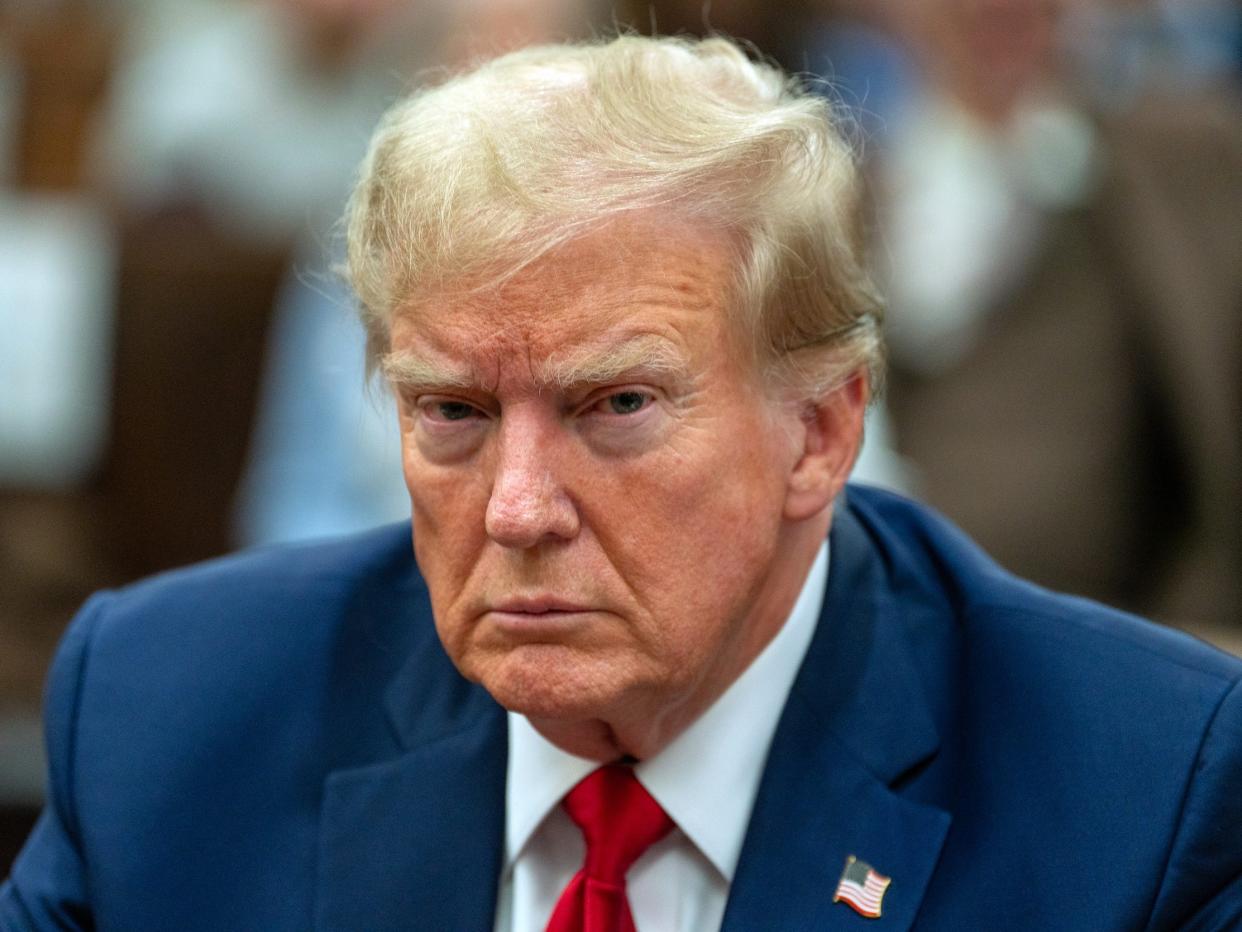NY fights to save Trump hush-money sentencing, saying it's a harmless error if evidence he's immune from entered the case

- Oops!Something went wrong.Please try again later.
- Oops!Something went wrong.Please try again later.
- Oops!Something went wrong.Please try again later.
Prosecutors are fighting to keep Trump's hush-money sentencing on track despite any "immunity."
On Thursday, they argued it's a harmless error if evidence he's immune from entered the case.
Trump would have been convicted despite any official-act evidence, they argue.
Manhattan prosecutors are fighting to keep Donald Trump's September 18 hush-money sentencing on track, saying in a new filing Thursday that it was "harmless error" if evidence he's now immune from entered the case.
Trump's recent US Supreme Court immunity victory "has no bearing on this prosecution," lawyers for District Attorney Alvin Bragg argue in a 69-page court filing.
"That holding has no bearing here because, as defendant does not dispute, the charges in this case all involve purely personal conduct, rather than official presidential acts," the filing says.
But Trump would have been indicted and convicted even if evidence the defense calls "official" were removed, the filing adds.
Trump was indicted in April, 2023, and convicted in May, 2024, on 34 felony counts of falsifying business records. Trump falsified 34 Trump Organization records throughout 2018 in order to hide hush money he paid to porn actor Stormy Daniels as part of a conspiracy to illegally influence the 2016 election.
The DA's filing is a response to defense arguments that prosecutorial immunity voids not just his conviction, but the hush-money indictment in its entirety. The SCOTUS decision found that using official-act evidence in prosecuting a current or former president violates their constitutional rights.
The defense argued the grand jurors who voted to indict Trump and the trial jurors who voted to convict him were all shown significant evidence involving Trump's official acts, and that this evidence is now retroactively inadmissible.

On Thursday, Bragg responded in papers signed by Matthew Colangelo, an assistant district attorney who was a lead prosecutor on the case.
The filing argues that Trump is wrong in now stamping much of the prosecutor's case "official act evidence."
The defense is challenging four incriminating 2018 tweets shown to jurors from Trump's personal Twitter account, in which he referred private payments to Daniels by his then-personal attorney, Michael Cohen. But these tweets describe unofficial acts unrelated to Trump's official duties, and for which he has no immunity, the prosecution filing now argues.
"Trump was not performing, or even describing, any official presidential act in conveying his personal opinions about his personal attorney and a private nondisclosure agreement entered into prior to his Presidency," the filing says of the four tweets. "No Presidential decision-making was involved."
The defense is also challenging trial testimony by Hope Hicks, Trump's former White House communications director, who described an incriminating 2018 Oval Office conversation in which Trump expressed relief that Daniels' claims to a one-night sexual encounter surfaced only after the 2016 election.
But this conversation again involved a hush-money scheme that "was entirely personal and largely committed before the election, and it had no relationship whatsoever to any official duty of the presidency," the prosecution filing continues.
Additional challenged evidence — an incriminating government ethics form Trump signed in 2018, and snippets of trial testimony by Cohen and by Madeleine Westerhout, Trump's former White House assistant — all likewise concerned private, not presidential, matters, prosecutors argue.
But even if the challenged evidence was removed from the trial, "the error was harmless in light of the overwhelming evidence of defendant's guilt," the filing argues.
As for tossing the underlying indictment — a move that would take Trump off the hook entirely — the prosecution filing argues that Trump would have been indicted even without what the defense calls "official act" evidence.
The submission of some inadmissible evidence during the grand jury presentation "is held to be fatal only when the remaining legal evidence is insufficient to sustain the indictment," the filing says, quoting caselaw from 1996.
Still, "the indictment in this case was not 'based on' any evidence of immune conduct," prosecutors argue.
Lawyers for Trump did not immediately respond to requests for comment on the prosecution filing.
The trial judge, state Supreme Court Justice Juan Merchan, has said he will issue a written decision on September 6 on whether the indictment and conviction survive this challenge.
If they do, Trump will be sentenced September 18 as planned, the judge has said.
Read the original article on Business Insider

